Compassion Ghana is intensifying its fight against the spread of HIV and AIDS with Compassion’s AIDS Initiative. Among the many activities aimed at achieving this objective is education.
Florence Sena Amponsah is a Partnership Facilitator for 12 Compassion-assisted child development centers. She has been with Compassion Ghana for one year now. She is involved with a pilot program to train youths to educate their peers about HIV and AIDS.
“When children get to a certain age, around the teenage years, they tend to relate more to their peers and their siblings who are closer to them in age than they would from their parents or teachers or adults in general.
“Parents and adults have the inclination to be uncommunicative on issues concerning sex, but children get to an age where they need answers to many things happening to their bodies. When they do not get the responses they require, they turn to their peers for information.
“Most times the information shared among peers is by and large wrong and detrimental.
“Considering these facts, we believe that when the capacity of children whom we call ‘Peer Educators’ is built up by equipping then with right knowledge and correct information, then these children can carry the message across to other children, their communities, their churches and even in their schools.
“What they are learning are most of the general things they need answers to at their developmental stage, which they are not able to openly talk about.
“The Peer Educators Training is in the pilot phase for 12 child development centers, presenting two children from each. So there are 24 children involved in the pilot.
“From what I have seen so far, I can confidently say that the program is going to make a great impact. The group of children here are highly intelligent, and judging from their participation, I can tell they are learning a lot as they find the topics to be relevant to them.
“We chose HIV and AIDS as the topic for the peer educators because HIV and AIDS is a disease which is threatening Africa. It has cut across many countries, and is a problem here in Ghana.
“We have orphans, we have people who have been infected with the disease, so we are building the capacity of these peer educators to carry the message.
“They are being taught how the disease is spread so that if they know, they will make informed decisions about themselves. At least they will know how to protect themselves.
“They are also being taught the need to care for other people who have the disease to help prevent discrimination, isolation and rejection.”
Comfort is a parent and the Vice Chairman of the Association of Parents. She is a trader who deals in used clothing. She is among the many parents who have had the opportunity to benefit from HIV and AIDS education as part of our AIDS Initiative.
“I have come here for the parental meeting. My son is in the child development center. His name is Wesley. We named him after John Wesley, the founder of the Methodist Church.
“I have benefited so much from these meetings. Through these educations, I am well informed on HIV and AIDS.
“Now I know that a person can be carrying the disease for a long time without knowing it. I now know that HIV is when the person has the virus, but is not sick with AIDS but can spread the disease.
“I have been encouraged to go for voluntary testing because it is good to know your status early, so that help can be given to you to keep you from getting sick with AIDS itself.
“We were talked to about stigmatization of AIDS patients. Now I know that I cannot catch the disease just by socializing with a person with AIDS.
“I have a different attitude toward AIDS now. I do not know my status yet, but the next time the opportunity comes, I will be the first person to go for testing. I am already encouraging my friends who did not get the chance to be in these meetings to go for counseling and testing, because that saves life.
“In fact, I am sharing all I know about the disease with anybody I get the chance to talk to.”
Nyarko is 12 years old and is a peer educator.
“I have just graduated from junior secondary school and about to enter senior high school. As a peer educator, I am learning about HIV and AIDS, teenage pregnancy and many more topics.
“I have been told that AIDS is now a major problem in Africa, and more and more people are getting it and more people are dying. I also know that even though a lot of education is going on, many more people are still ignorant about the disease and teenagers are also getting it. Ghana has to intensify education on HIV/AIDS.
“In Ghana there is an increase in orphans due to parents dying from the disease. There is also an increase in the poverty rate because many people are so sick and weak with the disease that they cannot work to support themselves and their families. The high poverty rate has also pushed the youth into prostitution, which is helping the disease to spread.
“I now know that HIV is the virus and AIDS is the disease itself. There is no cure for AIDS so it is important that we abstain from sex. We have also had lessons in sex education, the different forms of abuses and how to identify them. I have learned a lot.
“I have also learned that it is only by doing the HIV/AIDS test that you can tell your status. I know now that it does not mean that you are going to die the moment you have the virus, HIV. But if you know your status and start taking good care of yourself early by taking your drugs and eating good diet, you can live for many years without getting AIDS.
“I intend to share what I have learned with my friends at the student center. I will educate everyone my age I come into contact with. I can even educate some adult who would be willing to listen to me.
“I will tell the girls that even if they do not get AIDS from having sex, they can get pregnant and drop out of school and their life will be a mess.
“I will tell them about all the forms of abuses and let them know that rapists are not strangers alone but rather can be close relatives or well-known people. I have also learned that boys can be raped. I will share with them what to do if they find themselves in any of these bad situations.”

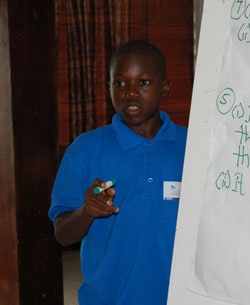 “I have just graduated from junior secondary school and about to enter senior high school. As a peer educator, I am learning about HIV and AIDS, teenage pregnancy and many more topics.
“I have just graduated from junior secondary school and about to enter senior high school. As a peer educator, I am learning about HIV and AIDS, teenage pregnancy and many more topics.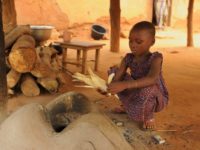
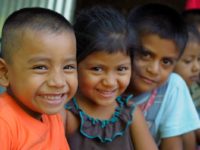
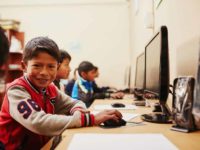
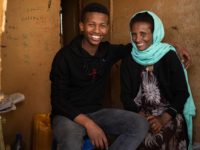


7 Comments |Add a comment
Wow. This is such a beneficial program for the people of Ghana. I’m super impressed with 12 yr old Nyarko’s comments. Great job, young man! The education and instruction about this disease will most benefit the people of Ghana if it comes from within – from people just like Nyarko. I pray that many more like him will rise up and be faithful witnesses with information about HIV/AIDS, as well as of the gospel of Christ.
Gladys,
If you’re looking for employment with Compassion in the U.S., you can view all of our job openings on compassion.com.
https://www.compassion.com/employment/default.htm
am totally in love with the work of compassion and am so much interested in working with compassion. how do i go about it
Thank you
Considering how much of a stigma is attached to males being raped in the US, I am glad that despite the taboo subject, Compassion is providing accurate training their peer educators and others in Ghana. It is much easier to ignore a problem, and I am proud Compassion takes the high road and addresses not only that the problem (and many others) exist, but provide means to assist victims.
It is good. It is so sad that children in every country in the world need to know these things to protect themselves. I am glad they are being equipped to protect themselves. I wish they didn’t have to be.
God bless Compassion Ghana for the good work they are doing.
I’m encouraged when I read this . . . So thankful for the work Compassion is doing.